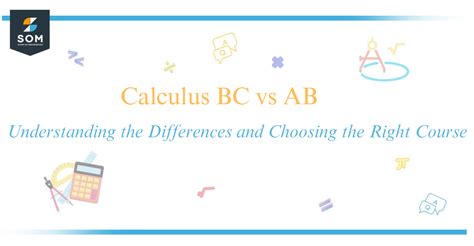Introduction
Calculus is a branch of mathematics that deals with rates of change and derivatives. It is a fundamental tool used in various fields including physics, engineering, economics, and finance. For students interested in pursuing these fields, it is essential to have a solid foundation in calculus.

There are two main levels of calculus offered in high schools: Calculus AB and Calculus BC. Both courses cover the basics of calculus, but they differ in terms of depth and content. This article provides a comprehensive comparison of Calculus AB and Calculus BC to help students make an informed decision about which course is right for them.
Calculus AB vs BC: A Side-by-Side Comparison
Course Content
Calculus AB
- Limits and continuity
- Derivatives and applications
- Integrals and applications
Calculus BC
- All topics in Calculus AB
- Additional topics including:
- Parametric equations
- Polar coordinates
- Differential equations
- Integrals involving trigonometric functions
- Improper integrals
Course Rigor
Calculus AB
- Less rigorous than Calculus BC
- Focuses more on conceptual understanding
- Less emphasis on proofs and theorems
Calculus BC
- More rigorous than Calculus AB
- Prepares students for college-level calculus
- Greater emphasis on proofs and theorems
Course Length
Calculus AB
- Typically one semester
- Covers approximately 80% of the content in the College Board Calculus AB Exam
Calculus BC
- Typically two semesters
- Covers 100% of the content in the College Board Calculus BC Exam
Prerequisites
Calculus AB
- Pre-Calculus or Algebra II with Trigonometry
Calculus BC
- Completion of Calculus AB or Pre-Calculus with strong trigonometry skills
Which Course is Right for You?
The decision between Calculus AB and Calculus BC depends on your individual goals, academic aspirations, and future career plans. Here are some key factors to consider:
- Intended major: If you plan to major in a STEM field, such as physics, engineering, chemistry, or biology, Calculus BC is highly recommended.
- College expectations: Many colleges and universities require students to take Calculus BC for admission to STEM programs.
- Academic ability: If you are comfortable with challenging mathematics and have a strong foundation in Algebra II and trigonometry, Calculus BC may be a suitable option.
- Career goals: If you aspire to a career in fields such as finance, economics, or data science, Calculus AB may be sufficient.
Career Applications
Calculus is an essential tool for professionals in various industries. Here are a few examples of how calculus is used in real-world applications:
- Engineering: Designing structures, bridges, and vehicles
- Physics: Analyzing motion, forces, and energy
- Economics: Modeling economic growth, inflation, and consumer behavior
- Finance: Valuing stocks, bonds, and options
- Data science: Analyzing large datasets to identify trends and patterns
Tips for Success
Whether you choose Calculus AB or Calculus BC, there are some general tips that can help you succeed in the course:
- Attend class regularly and take detailed notes.
- Complete all homework assignments and practice problems.
- Seek help from your teacher or tutor when needed.
- Use online resources and study guides to supplement your learning.
- Review your notes regularly and practice solving problems.
- Take practice tests to prepare for the College Board Calculus Exam.
Frequently Asked Questions
Q: Which exam do I need for college?
A: The College Board offers two exams: Calculus AB and Calculus BC. The exam you need will depend on the requirements of the colleges you are applying to.
Q: Is Calculus AB enough for engineering?
A: While Calculus AB may be sufficient for some engineering programs, Calculus BC is generally preferred and may be required for admission to competitive programs.
Q: Is Calculus BC harder than AB?
A: Yes, Calculus BC is generally considered more challenging than Calculus AB due to its increased rigor and additional content.
Q: Can I skip Calculus AB and take Calculus BC?
A: It is not recommended to skip Calculus AB and take Calculus BC directly. While some students may be able to succeed in Calculus BC without taking AB, it is generally not advisable.
Conclusion
Calculus AB and Calculus BC are both important courses that can provide a strong foundation in mathematics. The choice between the two courses depends on your individual goals and future plans. If you are unsure which course is right for you, it is recommended to consult with your academic advisor or mathematics teacher.
